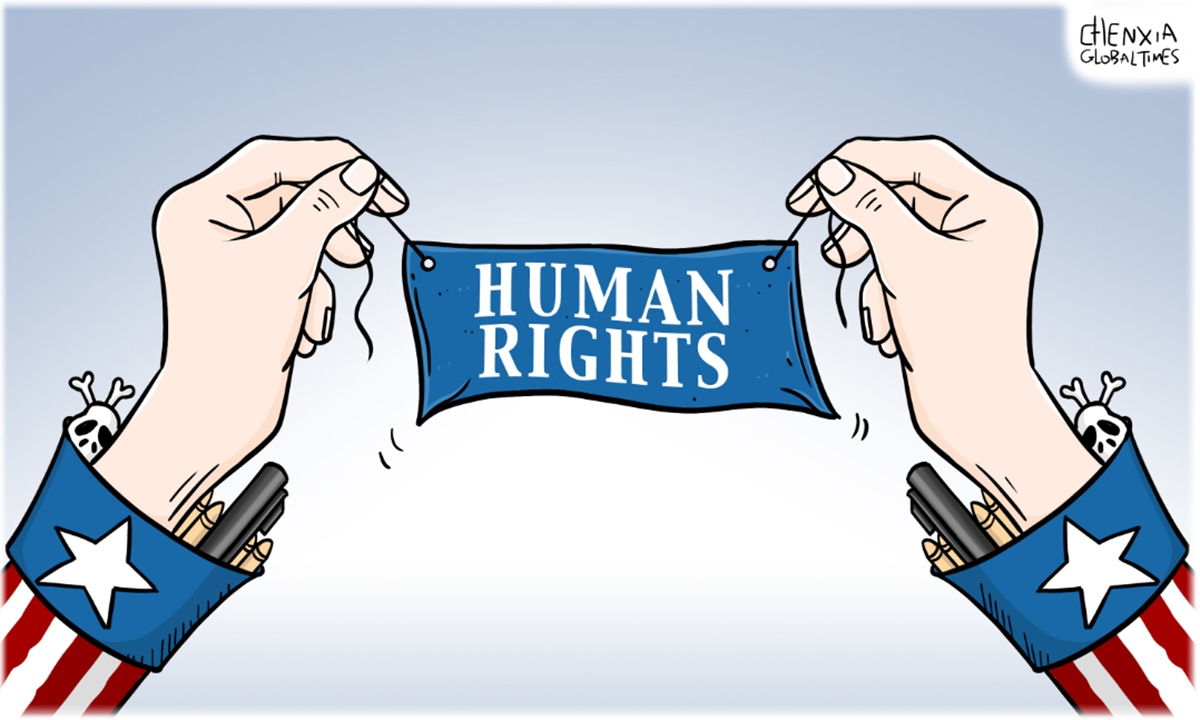
Illustration: Chen Xia/GT
New revelations of grim history Recently, a US federal government report revealed the brutal conditions Native American children suffered when they were placed in boarding schools during a course of 150 years. "Approximately 19 federal Indian boarding schools accounted for over 500 American Indian, Alaska Native and Native Hawaiian child deaths," the report said. The number is expected to grow as further investigation unfolds.
Kids as young as 4 were forcibly taken away from their families and sent to the schools, where they were made to assimilate to the government's preferred way of life and become the so-called "good Americans." They were pushed, often through violence, to abandon their native languages, cultures and religious practices. Disease as well as sexual, physical and emotional abuse was widespread. Historians estimate over 40,000 child deaths were a direct or indirect result of the boarding school system.
The American history is never short of atrocities. The US and the European settlers carried out numerous massacres against indigenous peoples, leading to massive depopulation from over 5 million in 1492 to less than 250,000 by 1900. This is a clear-cut case of genocide.
In indigenous communities, the revelations about the boarding schools have stoked a new resolve to seek accountability for the brutal past. Alas, although dark history is revealed again and again, the path toward healing is still bumpy.
The trauma is never goneThe systematic repression of Native Americans continues to this day. They are grappling with limited access to electricity, clean water, health facilities and education opportunities. In the Native communities, you see some of the highest rates of poverty and premature death and suicide, and the lowest rate of graduation. The COVID-19 pandemic has worsened the plight of the indigenous peoples.
Figures speak aloud. Life expectancy of the Native Americans is 5.5 years lower than the US average. Their poverty rate is 25.4 percent, the highest of all minority groups in the United States. 84.3 percent of American Indians and Alaska Natives have been physically assaulted. Only four Native Americans are serving in Congress. 87 percent of state-mandated history textbooks do not mention a single word of Native Americans' ongoing battle for civil rights.
As of now, apologies in the US have been few and far between. Former president Barack Obama signed a resolution in 2009, apologizing for past "ill-conceived policies toward the Native peoples of this land," yet the resolution had no real impact on federal policy toward Native Americans. The appointment of Deb Haaland, a Native American, as interior secretary is nothing but a superficial effort, which could hardly bring a true difference to the human rights conditions of Native Americans.
Chinese writer Lu Xun wrote, "Lies written in ink cannot disguise facts written in blood." The Native Americans still await the government's formal recognition of those crimes against humanity and genuine efforts to make amends. A real change calls for actions, rather than slogans.
Human rights violations aboundWhen it comes to the US' dismal human rights records, the story of Native Americans is just a tip of iceberg.
Internally, racial inequality is rampant. Assumptions that people of color didn't have the capacities of full citizenship have a lingering effect on African Americans today. The likes of George Floyd and Michael Brown were killed as a result of police brutality. Thousands of people of Asian descent have reported attacks and racial discrimination after the outbreak of the COVID-19. There are also other forms of human rights violations, like gun violence, migrant pushbacks, child abuse at detention centers, the government's reckless COVID-19 response, to name just a few.
Externally, the US has spent over 90 percent of its 240-plus-year history on wars, with 800 military bases built in more than 70 countries and regions, causing turmoil in the Middle East, Latin America, and Asia. The wars waged by America in Afghanistan, Iraq and Syria alone have caused more than 20 million people to become either refugees or migrants. The infamous Guantanamo prison still holds dozens of men, where numerous cases of torture, forced disappearances and secret transfers have taken place in the past 20 years. Successive US administrations promise to close the facility, yet no actions have followed.
A land of hypocrisy and double standardsThe US has been at the forefront of condemning human rights abuses globally, as if the US is the world's human rights role model to be emulated. China, Russia, Iran and Belarus are among the frequent targets of US' finger-pointing, mostly based on groundless charges. However, given its gloomy human rights records within its borders and beyond, the US' hypocrisy and double standards have been laid bare.
It is clear that the US is not a champion of human rights, but a defender of hegemony, using human rights as a political instrument. At the previous Human Rights Council sessions, over 100 countries voiced their concerns about the US' systemic human rights violations, and more importantly, urged the US to give up its narcissism and stop interfering in others' internal affairs with excuses of human rights.
Each country is the best judge of its own human rights situation. Instead of lecturing other countries on their human rights, the US needs some self-introspection and should first address its own human rights problems. When the US truly practices what it preaches, the global human rights cause will be in a better shape.
The author is a current affairs commentator. opinion@globaltimes.com.cn




